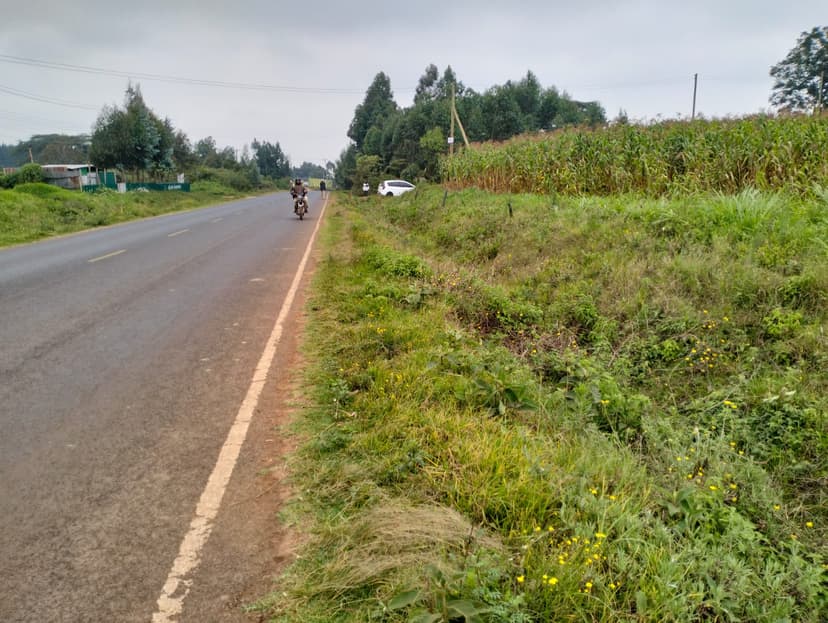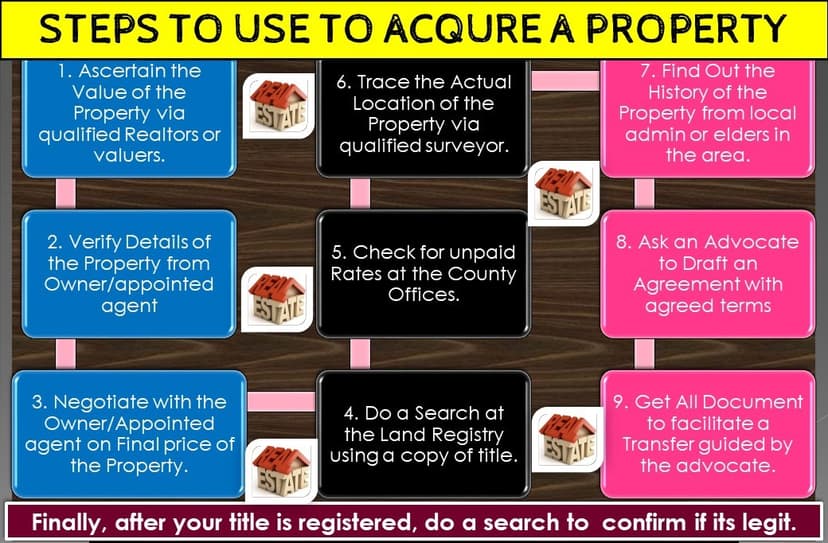What is Due Diligence?
Due diligence is the process of carrying out thorough background checks on a piece of land before committing to buy. It helps you confirm that the seller has genuine ownership, that there are no hidden disputes, and that the land is legally fit for transfer. In short, it protects you from fraud and ensures your money is safe.
In Kenya, effective due diligence should happen in four phases, guided by land laws and standard real estate practices. Here’s how you should go about it:
1. Historical Searches
This step involves looking into the land’s history and past ownership.
Green Card Search:
At the land registry, request a green card (not to be confused with the U.S. immigration term). The green card is the official record of a parcel of land, listing all previous owners, transfers, and charges. It helps you see if ownership has been passed too many times (a red flag) or if there are suspicious entries.Local Authority & Community Inquiries:
Go beyond paperwork—ask around. Speak to neighbors, area chiefs, elders, or even church leaders to confirm if the land has been free of disputes. Many land conflicts in Kenya are long-standing family battles that may not yet be in court records but are known locally.
Practical Tip: Always cross-check the green card details with what locals say. If stories don’t match, dig deeper before proceeding.
2. Registry Search
This is a critical check at the Ministry of Lands offices.
Official Search Certificate (Form RL 26):
Apply for an official land search at the land registry where the property is registered. This search reveals the current registered owner, the exact land size, encumbrances (e.g., loans, charges, or caveats), and whether the land has pending restrictions.Why It Matters:
An encumbrance means you cannot freely transfer ownership until it is cleared. For instance, if the land is used as collateral for a loan, you might buy it only to find the bank has rights over it.
Practical Tip: Always insist on the official search certificate (signed and stamped), not just a photocopy the seller provides.
3. Judiciary Search
Court cases can tie land ownership for years, making your investment a legal nightmare.
Check for Pending or Past Cases:
Visit the Kenya Law Courts registry or use the Kenya Law Reports online database to search for cases linked to the land parcel or the seller. Ask your lawyer to assist if you’re unfamiliar with the process.Why It Matters:
Land might be under dispute in succession matters, family inheritance, or fraud cases. Even if you buy, you could be dragged into a long legal battle.
Practical Tip: Engage a qualified property lawyer to handle this search—they can quickly spot legal red flags you might miss.
4. Company or Individual Search
Finally, confirm that the seller is who they claim to be.
If Seller is a Company:
Conduct a search at the Registrar of Companies to verify:Whether the company is legally registered.
Who the directors and shareholders are.
If the company is allowed by its Memorandum & Articles of Association to sell property.
If Seller is an Individual:
Ask for the seller’s original national ID and confirm its authenticity at the Registrar of Persons. Cases of identity theft or fake IDs in land transactions are common.
Practical Tip: For companies, always deal with directors formally listed in the registry. For individuals, make sure the name matches the title deed and ID exactly.
Why Due Diligence is Non-Negotiable in Kenya
Due diligence is not just a formality—it’s a legal safeguard. According to the Land Registration Act, 2012, a registered landowner has rights, but only if the title is clean and free of fraud. Skipping these steps could mean buying land with hidden loans, fake titles, or ownership disputes.
By following all four phases—historical, registry, judiciary, and seller verification searches—you secure your investment and avoid the painful stories of Kenyans who have lost millions to land fraud.
✅ Final Word:
Before paying even a shilling as deposit, complete all due diligence with the help of a licensed surveyor, advocate, or real estate consultant. Remember: in Kenyan real estate, rushing is the biggest mistake. Patience saves you millions.




